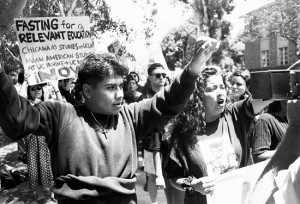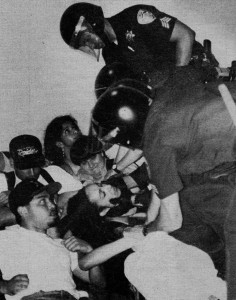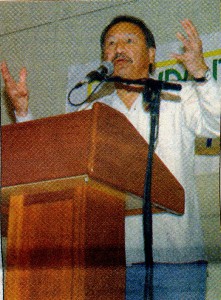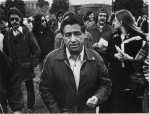The original photo credit contained an error and has been changed. See the bottom of the article for additional information.
Cesar Chavez was a prominent Latino activist and labor organizer. Chavez organized and led numerous successful demonstrations to advocate on behalf of improved wages and living conditions for agricultural workers and advocated non-violent resistance tactics, including hunger strikes.



Chavez co-founded the United Farm Workers union with Philip Cruz and Dolores Huerta. At the age of 73, Huerta was appointed by California Gov. Gray Davis to the UC Board of Regents.
In the spring of 1993, more than 150 students marched to support the establishment of a full Chicana and Chicano studies department, end budget cuts to ethnic centers across campus and prevent the replacement of the then-current interim director David Lopez.
The protests resulted in 85 arrests and about $100,000 in damage, but were successful in paving the way for the establishment of a center for interdisciplinary instruction, which was later named in honor of Cesar E. Chavez.
UCLA’s Chicana/o studies program has a storied history, beginning with the foundation of the Institute of American Cultures, an ethnic studies research center, in 1969.
The same year, the Center for African American Studies, the Asian American Studies Center and the Chicano Research Center were established.
The Chicana/o studies department was officially established in 2005, and renamed the Cesar E. Chavez Department of Chicana/o Studies in 2007.
In February 2005, about 200 students crowded into a teach-in at Ackerman Grand Ballroom, chanting “Si, se puede!” The phrase, translating to “Yes, it can be done!” was coined by Chavez during his work in the 1960s.
One of the featured speakers was Arturo Rodriguez, president of the United Farm Workers union. Partially organized by the UCLA Labor Center, the event commemorated the role college students have played in civil rights movements.
“Cesar Chavez saw the need for change and made a courageous choice to work to improve the lives of his fellow farm workers.”
—President Barack Obama, proclamation for Cesar Chavez Day
Correction: The photo is from Movimiento, used under a Creative Commons license.
